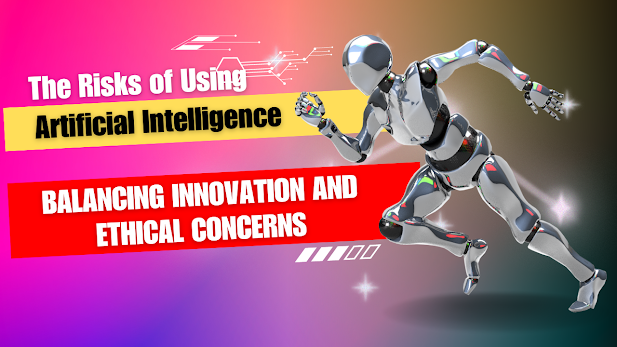The Risks of Using Artificial Intelligence: Balancing Innovation and Ethical Concerns
Navigate AI's risks: Striking a balance between innovation and ethics. Explore the challenges in harnessing AI's potential responsibly.
Introduction
Artificial Intelligence (AI) has emerged as a transformative technology with the potential to revolutionize various industries, from healthcare to finance and beyond. Its ability to analyze vast amounts of data, make predictions, and automate complex tasks has paved the way for exciting advancements. However, alongside the benefits, there are inherent risks associated with the use of AI. As we embrace the potential of AI, it is crucial to carefully consider and address the ethical, societal, and practical challenges that arise from its implementation.
Bias and Discrimination
One of the primary concerns regarding AI is the potential for bias and discrimination in decision-making. AI algorithms learn from historical data, which may contain biases present in society. The issue of bias in AI systems is a significant concern. AI systems are trained on data that reflects existing societal biases, and if not adequately addressed, these biases can be perpetuated or amplified. If a recruitment algorithm is trained on data that reflects gender or racial biases, it may inadvertently perpetuate discriminatory practices when making hiring decisions. It may lead to the reinforcement of societal inequalities. For instance, in recruitment processes, AI algorithms may unknowingly favor certain demographics, leading to discriminatory hiring practices. It is essential to invest in diverse and representative datasets and implement robust testing and validation processes to mitigate such biases. To address this risk, organizations must ensure that the data used to train AI models is diverse and representative. Additionally, ongoing monitoring and auditing of AI systems are essential to identify and rectify biases that may emerge over time.
Privacy and Security
AI often relies on vast amounts of personal information to function effectively. As AI systems become more sophisticated, there is an increased risk of privacy breaches and unauthorized access to sensitive information. Organizations must prioritize data protection by implementing robust security measures, ensuring data anonymization when possible, and obtaining proper consent from individuals whose data is being used. To protect data from cyberattacks governments need to enforce organizations to ensure compliance with relevant data protection regulations. Striking a balance between utilizing data for AI advancements and safeguarding personal privacy is crucial.
AI systems often rely on extensive amounts of personal data to operate effectively. This raises concerns about privacy breaches and unauthorized access to sensitive information. Organizations must implement robust security measures Encryption, secure storage, and proper data anonymization techniques should be employed to safeguard individual privacy. Transparency and accountability in data handling practices are essential to build trust with users and mitigate privacy risks.
Lack of Transparency and Explainability
AI algorithms can be very much complicated and operate as "black boxes," making it challenging to understand how they arrive at particular decisions. This lack of transparency raises concerns about accountability and ethics. For critical applications such as healthcare and criminal justice, it becomes essential to develop AI models that can explain their decision-making process in a human-understandable manner. Researchers and policymakers must focus on developing explainable AI systems to foster trust and accountability.
Many AI algorithms, particularly those based on deep learning techniques, can be highly complex and difficult to interpret. This lack of transparency and explainability raises concerns about accountability, trust, and the ability to challenge AI-driven decisions. In critical domains such as healthcare or legal contexts, it is crucial to understand how AI arrives at specific conclusions or recommendations. Research efforts are underway to develop explainable AI models that provide understandable explanations for their decision-making processes. Striking a balance between AI performance and explainability is necessary to address this risk.
Unemployment and Economic Disruption
The automation capabilities of AI have the potential to replace human jobs, leading to concerns about unemployment and economic disruption. While AI may create new employment opportunities, the transition may be challenging for those whose jobs are displaced. Adequate measures such as retraining programs and social safety nets need to be implemented to address the potential impact on the workforce and mitigate societal disruption.
As AI systems automate tasks previously performed by humans, there is a concern that widespread implementation of AI technologies may lead to job displacement and economic disruption. Industries such as manufacturing, transportation, and customer service may experience significant changes due to automation. Governments, businesses, and educational institutions must collaborate to implement strategies for retraining and upskilling the workforce. By focusing on developing skills that complement AI technologies, individuals can adapt to the changing job market and minimize the negative impact on employment.
Malicious Use and Autonomous Weapons
AI can also be misused for nefarious purposes. The development of autonomous weapons and the use of AI in cyberattacks pose significant risks to global security. There is a pressing need for ethical guidelines and international cooperation to regulate the development and deployment of AI technologies, particularly in sensitive areas that could lead to harm or undermine human rights.
AI technologies can be misused for harmful purposes. The development of autonomous weapons systems, capable of making lethal decisions without human intervention, raises ethical concerns and poses risks to global security. International cooperation is necessary to establish regulations and guidelines that prevent the development and deployment of AI in ways that undermine human rights or contribute to an arms race. Strict ethical standards and legal frameworks are essential to ensure that AI is used responsibly and in alignment with societal values.
Conclusion
Artificial intelligence holds immense potential to enhance our lives and drive significant advancements across various sectors. However, as with any powerful tool, there are risks that must be acknowledged and mitigated. By addressing issues of bias, privacy, transparency, and unemployment, we can work towards a future where AI is harnessed responsibly and ethically. It is crucial for researchers, policymakers, and society as a whole to collaborate, establishing clear guidelines and regulations to ensure that AI is used for the benefit of humanity while minimizing its potential risks.
In conclusion, while the potential benefits of Artificial Intelligence are immense, it is crucial to address the associated risks to maximize its positive impact on society. By actively working to mitigate bias, safeguard privacy, enhance transparency, manage workforce transitions, and regulate AI in sensitive domains, we can foster an environment where AI technologies are utilized responsibly, ethically, and for the benefit of humanity. Ongoing research, public discourse, and collaboration among stakeholders are vital to strike a balance between innovation and the ethical concerns surrounding AI.






No comments